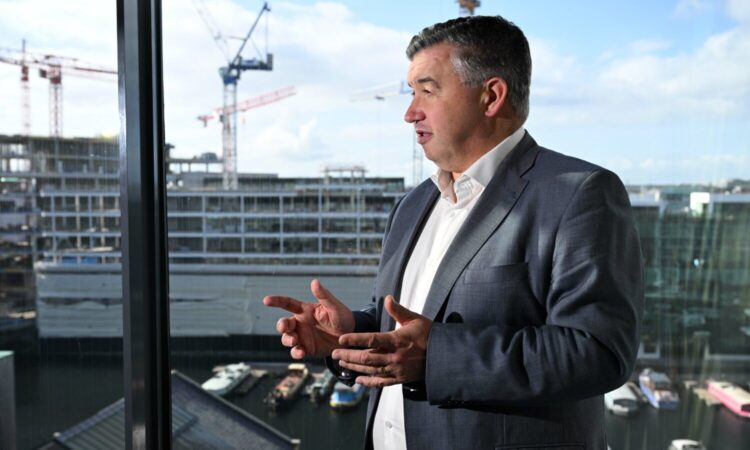
Will Carmody has witnessed first-hand the ebbs and flows of the Irish economy over the past 15 years.
Recently installed as managing partner of the blue-chip law firm Mason Hayes & Curran, Carmody has a background in financial services and the energy sector.
He advised clients during the financial crisis more than a decade ago and helped companies navigate the pandemic.
The financial crisis, as he told Tom in a fascinating interview last week, shaped some of his thinking.
“There were daily calls with senior treasurers in financial institutions running through how many hundreds of millions left the bank yesterday. ‘Are we funded into next week?’ It was those types of conversations. High-wire stuff,” he said.
The law firm that he leads has its finger on the pulse of the Irish economy. It works with multinationals, indigenous start-ups, and various semi-state enterprises. As such, Carmody’s views on the prospects for the economy are worth noting.
According to Carmody, Ireland is not facing anything like what it saw in decades past when multiple firms collapsed. However, it is still facing significant headwinds.
“There is a more challenging business environment coming,” he told Tom. “But I think it’s going to be slightly different than the sort of recessions in the 1980s or the 1990s or the financial crisis when you had wholesale receivership appointments and things like that.”
He added: “I think funders and creditors see now having done all of that before there is a huge cost both in terms of time and money as well. I think you will see a lot more actual restructuring, negotiation, refinancing.”
He is not the only one with such views.
Ken Fennell has spent his career liquidating and restructuring companies. Initially, it was through his own boutique accountancy firm Kavanagh Fennell, before he moved to Deloitte. Now, he is a managing director with Interpath Advisory, a fast-growing consultancy practice.
According to new statistics compiled by Interpath, the number of companies filing for insolvency across Ireland increased by more than 50 per cent over the past 12 months. However, the firm said that levels remain below forecasts as organisations continue to show resilience in the face of economic headwinds.
Fennell said that the “deluge of insolvencies” that many predicted has not emerged despite the unwinding of the various government supports. “The increase in corporate failures has been much more incremental,” Fennell said. “This is perhaps a little surprising, given the various headwinds seen in recent times, from interest rate increases to sticky inflation and a cost-of-living crisis, coupled with geopolitical turmoil in Ukraine and now the Middle East.”
According to Interpath, another factor that has dampened corporate insolvency levels is continued forbearance from other creditors, including lenders and landlords, who have preferred forbearance and restructuring to enforcement.
However, it said the appetite for forbearance is starting to wane.
“This, coupled with rising interest rates, high cost inflation and fragile consumer confidence means that the number of companies filing for insolvency in Ireland could continue to rise,” Interpath said.
Fennell pointed to the Revenue Debt Warehousing Scheme, which allowed certain tax debts to be “parked” on an interest-free basis for 12 months following the resumption of “normal” trading.
At its peak in January 2022, some 103,200 taxpayers had warehoused a total of €2.9 billion. By April 2023, 39,609 taxpayers had ceased to avail of the scheme, with 63,591 taxpayers warehousing €2.2 billion.
Recently published statistics from Revenue as at August 2023 show a further decrease in warehoused debt at €1.9 billion owed by 59,546 taxpayers. It remains a sizable number, and one that will cause significant problems to companies over the coming months – a point that I have written about on a number of occasions.
We are beginning to see the impact already. Mac Interiors collapsed after failing to achieve a write-down in its tax debts, while, in the coming days, a liquidator will be appointed to the largest F45 fitness franchisee in Ireland after two of its gyms were seized and stripped down by the Dublin sheriff.
“We believed that when we finally reopened post Covid that people would come rushing back to the gyms and we could start paying these Revenue debts down. When we reopened the landscape was completely different. People didn’t rush back,” the company said in an email to creditors last week.
The business will not be the only one to fall foul of the tax authority. The number of insolvencies has remained artificially low – due in large part to forbearance by the tax authority and by creditors. That forbearance is now coming to an end.
*****
Elsewhere last week, Rosaleen caught up with Louise Kennedy, who has dressed politicians, movie stars, and royalty. But what drives the designer to succeed, and, as she celebrates 40 years in the industry, what are her plans for the future?
Having failed to raise €50 million, Bio-Marine Ingredients Ireland is using the recently introduced Scarp process to restructure its debts. But first, it wants the High Court to grant it protection from its many creditors. Francesca has the story.
When Covid-19 decimated revenue from energy projects, Norman Crowley refocused his business on its data-crunching software. Now CoolPlanet is adding mining EVs to its offering and Crowley is upfront about what works and what doesn’t (especially livestock farming). He had a wide-ranging conversation with Thomas, also available as a podcast.
The EU Tax Observatory last week named Ireland as the joint top destination for multinationals to shift profits and cut corporation tax. In an interview, economist Gabriel Zucman says new global rules will benefit Ireland in the short term but believes the tax-competitive model is doomed.



